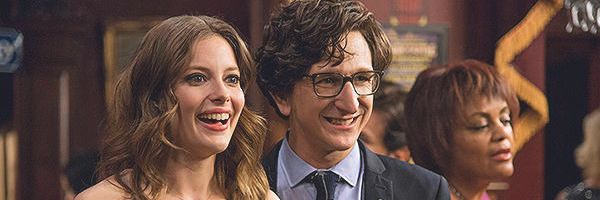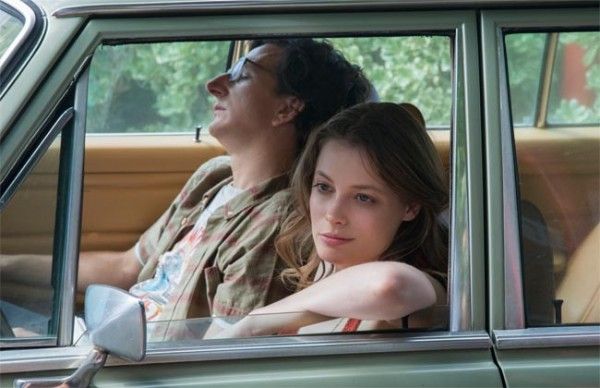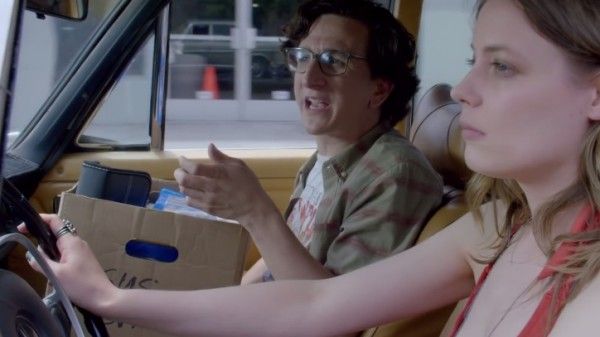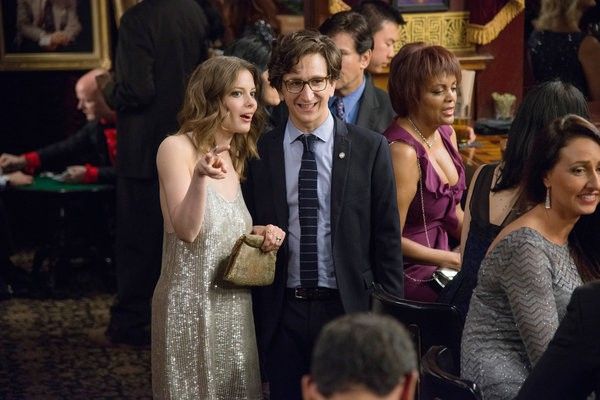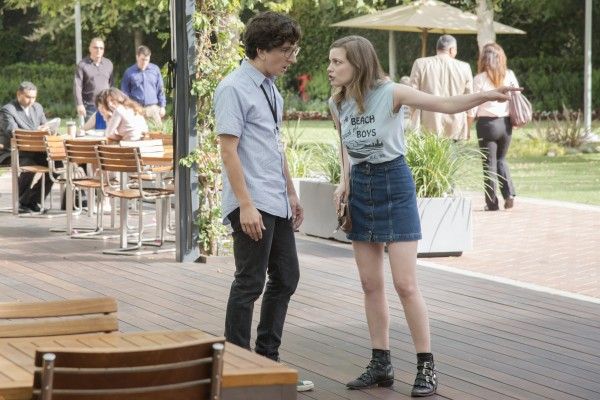At one point in Love -- the new Netflix comedy from Judd Apatow, Paul Rust, and Lesley Arfin -- the male half of the central duo, Gus (Rust), discusses the slightly pestering stereotype of "the wise African-American" in movies and film with what is essentially his own wise (and stoned) African-American friend, played by Jordan Rock. It's a rare peak at self-awareness for the relatively straightforward show, but not the only moment where the creators sheepishly suggest that they understand the cliched nature of what they're doing. At another point, Gus tosses out all his blu-rays in a fit, exclaiming that they offer nothing but lies about relationships. These scenes give the series a certain edge, nodding toward an intermittent attraction for emotional complexity and pop-culture knowledge, but they also raise a question of the show's more complacent, predictable turns of the 10-episode narrative.
The core of the story is the teetering romance between Gus and Gillian Jacobs' Mickey, who meet when she's in need of a few bucks for coffee and cigarettes at a local L.A. gas station market. Their meeting immediately sets up the philosophical outlook of both characters: she's willing to risk jail, banishment, and just about anything to be able to do exactly what she wants, and he wants to be helpful, to be liked and, just maybe, celebrated, despite his outward humbleness. And much of what each learns in Love are the limitations of this kind of thinking, and the positives of what they might find distasteful or unpalatable, which might rightly sound like a familiar dynamic in the realm of the romantic comedy to studied fans of the genre.
The trajectory of their story, and how they come to learn that they need one another, isn't particularly rousing. In the season's back stretch, it also grows tedious and predictable. When Gus becomes intimate with another woman, her place in his life feels temporary, existing primarily to offer an emotional counterweight to what Gus feels with Mickey. And if the series had not been produced and co-written by Apatow, that might have been all this character -- an actress on a supernatural soap opera called Witchita, for which Gus tutors the younger stars -- was created for. But as molded by Rust, Apatow, and Arfin, and played by Briga Heelan, the character becomes a fleeting yet effective vision of the life of a professional low-tier actress looking to make it, dealing with the dashed hopes of bit parts and unfavorable contract negotiations.
It's in this particular arena (that of the life of Hollywood's middle and lower classes or former stars) that Love is distinctly memorable, insightful, and quite involving. When Andy Dick arrives on the series, he begins by doing the same thing that you'd expect the comedian to do: straining to act outlandish and funny, to get the attention of as many people as possible. This includes him taking "organic ecstasy" with Mickey and going for a long ride on the L.A. subway, or attempting to charge his phone in a local food truck where his friends are trying to order burritos. But when the drugs wear off, Dick and Mickey have a frank, stirring conversation about the life of addicts, about what its like to yearn for a drug-induced high and the unbelievable regret that comes along with such needs, and how this is part of the accepted toll of a life in entertainment.
Drugs and drinking, and the lifestyles and psychological conditions they inhibit, are a central focus of the series, though it's ultimately part of a hash of the roiling underbelly of the television and movie industry. Heelan's character's apparent loneliness and false confidence represent an element as well, as does the stress and lack of focus exhibited by the young star of Witchita, Gus's main pupil, who is played by Iris Apatow. And this doesn't even get into Gus's attempts to break into the Witchita writers room, or the dark turns that Mickey's career in satellite radio take as she begins to fear for the future of her programming job. All of these scenarios have the sharpness and detail of true-life experience, which Apatow, Rust, and Arfin, as well as their fellow writers, summon forth in the hopes of seeing both the thrill and very real pain of a life of a struggling entertainer.
The intoxicating level of nuance, both emotional and otherwise, in such sequences and other scenes invested in performance, make the more routine machinations of the overall plot all the more souring. One of the more bland episodes involves Gus taking Mickey's Australian roommate out on a disastrous date, which plays out in familiar terms, and when the actors attempt to infuse the scene with some originality, the entire sequence comes off as a belabored improv session. This is even more disappointing in that, elsewhere, the cast heightens the material with tremendous inventiveness and acute physicality, with a special nod to Jacobs, one of the few reasons to watch more than one episode of Community.
Ultimately, Love feels stuck between a premise that would have worked much better as an extended film, an intimate vision of a young Apatow breaking into the TV world, and the by-the-numbers structure of a sitcom with a few flashes of genuine originality. That being said, the prospect of the already scheduled second season, in which the patterns of courtship are less important to the story, is promising, allowing for a more open canvas for Rust, Apatow and Arfin to relay their dispatches from our modern La La Land.
Rating: ★★★ Good

